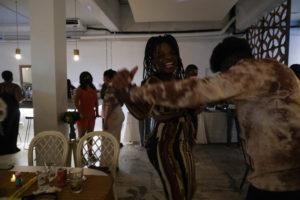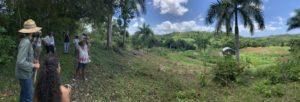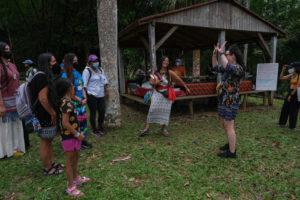A Movement Exchange for Healing and Justice
Gabriella Báez/República 21 Media
In May, Grassroots International, Move to End Violence (MEV), and several of our partners met in Puerto Rico for healing, reflection, and resistance.
The ten-day learning exchange brought together movement organizers from Honduras, Puerto Rico, and the United States to nurture transnational solidarity against violence in its multiple forms — from violence against the bodies and identities of women, LGBTQ+ populations, and people of color, to violence against territory and Mother Earth. In its intentionally intersectional approach, the exchange wove together struggles around gender and sexuality with struggles around race, class, land, migration, and more. And it centered and uplifted powerful work around healing justice and grassroots feminisms being advanced by social movements.
While a new relationship, the work of both MEV and Grassroots International has provided a strong basis for collaboration. Over the past ten years, MEV has brought together cohorts of leaders from the US working to end gender-based violence and heal collective trauma. Each cohort includes an international component, to learn from and support Global South movements doing similar work. MEV’s strong focus on healing and internationalism resonates deeply with Grassroots International’s values and our approach to accompaniment of social movements.
While we initially intended to hold the exchange in Honduras, rising COVID cases required us to rethink the original plan, moving it to Puerto Rico. In turn, the location change created new opportunities. Our Honduran partners OFRANEH, COPINH, and CODIMCA/La Via Campesina Honduras women’s articulation deepened and expanded their already-existing relationships with our Puerto Rican partners, such as an ongoing exchange between OFRANEH and los Centros de Apoyo Mutuo Jíbaros (Peasant Mutual Support Centers). Participants connected the trauma and violence of colonialism and heteropatriarchy — and resistance to them — across all three locales.
Below, see photos of powerful moments from the exchange and read initial reflections from our staff members who were present.
WHY THE EXCHANGE MATTERED
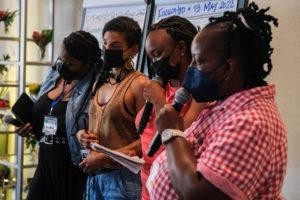
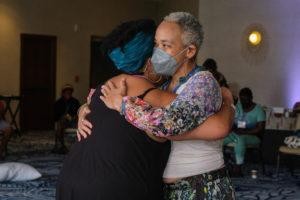

“For us, exchanges like this are very important because one of our political principles is solidarity. These are spaces to construct bridges of solidarity between movements that come from different parts of the world.”
— Jovanna Garcia Soto
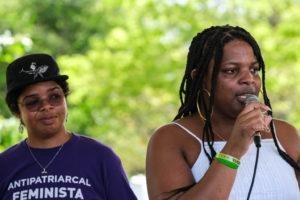

“There is a force of global capital that is repressing, assassinating, displacing… What we’re accompanying in this space is the creation of a global front of popular power.”
— Jovanna Garcia Soto

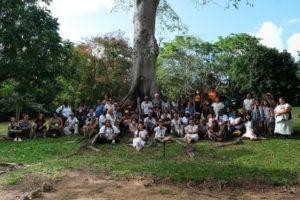
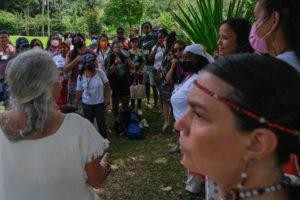

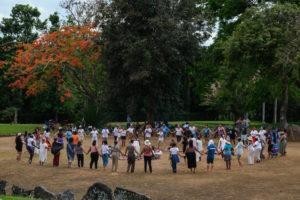
“What we’re trying to build, through people-to-people solidarity, is a response to the ways that the oppressive forces are attacking and dividing people. This is the antidote.”
— Sara Mersha
PUTTING PRINCIPLES INTO PRACTICE


“MEV was very intentional in how they created the meeting space, super honoring accessibility needs and ways for people to feel comfortable.”
— Diana Villa
“There was a practice and a language justice affirmation everyday, in English, Spanish, plus Garifuna. What does it mean to have an accessible space?”
— Trina Jackson
“One of the most important forms of rebeldía — of rebellion and resistance — is to practice joy. And so part of what I see us already doing is coming together to celebrate each other, to build that joy with one another and express it. And say, you know what, yes, we are claiming our right to have joy, to lift up life at the center of everything.”
— Sara Mersha
“I think one thing that was really clear to all of us is that we have to center our healing and our spirituality, and I think that has a vibration that will continue to be amplified beyond what happened here.That kind of vibration, once it’s animated and amplified and released, has to go outward. It’s power.”
— Trina Jackson
MEANINGFUL MOMENTS
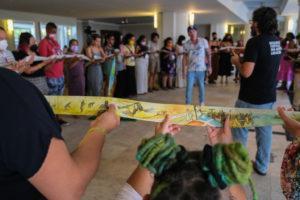



“Everyone was touched by the scroll of Agitarte. Through seeing the story of struggle in an interactive way, they connected with the reality of Puerto Rico. People saw their stories in the scroll even if they weren’t from Puerto Rico.”
— Jovanna Garcia Soto
“On a farm visit, a participant from the US of Cambodian origin connected with some of our Puerto Rican partners over the fact that Puerto Rico had been the testing ground for Monsanto’s Agent Orange. This is the same toxic chemical that was used by the US government against Southeast Asian people during the Vietnam War.”
— Diana Villa
“I feel spiritually uplifted by the connections that we’ve made with each other. It’s been an honor to be in this space connecting with all these folks across all of these different contexts — and stories. We’ve heard our own stories in others’ stories, and that’s such an important part of our healing.”
— Trina Jackson





